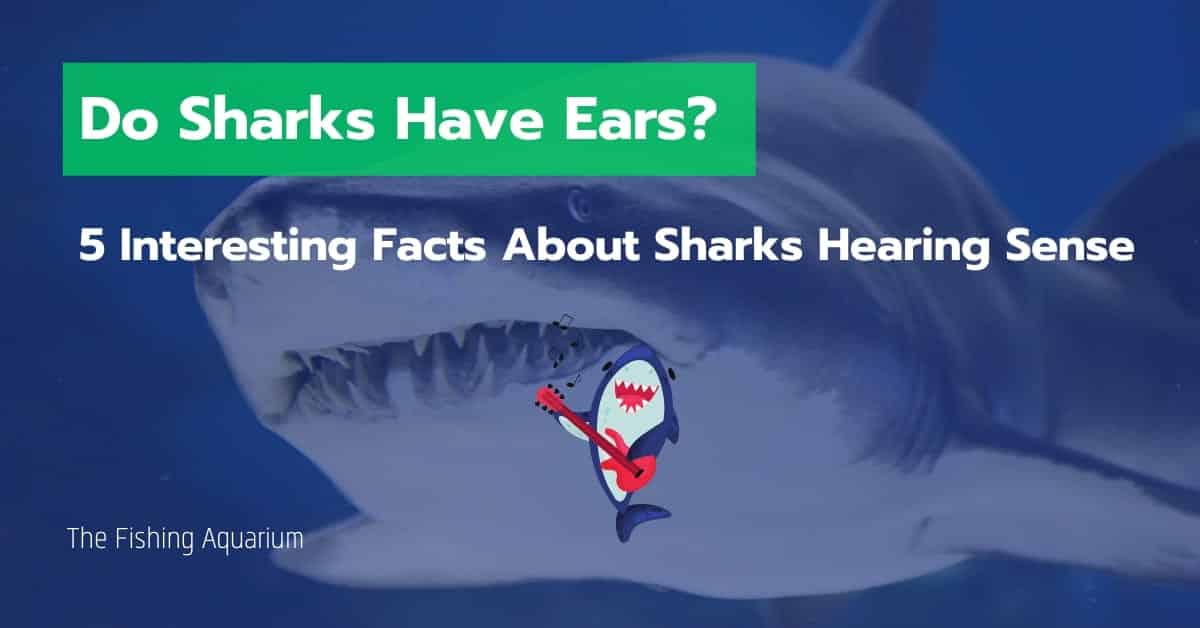Do sharks have ears? That is the question that many people ask themselves when they are wondering how do sharks hear. Some people assume that since sharks do not have external ear flaps, then they cannot hear at all.
This is false! Sharks do in fact have 3 different types of hearing: passive listening, active listening, and echolocation. These three senses help them to survive and thrive in their environment.
In this article, we will discuss 5 facts about sharks’ hearing ability, as well as answer some other questions you may be wondering.
In case you are in hurry and don’t have time to read the complete article. We have an on-point answer for you.
Do sharks have ears? Yes, sharks have ears but they are not visible on the outside. Sharks have a sense of hearing that other sea animal do not. Sharks can hear low-frequency sounds and are attracted to the sound of wounded prey. Sharks also have ears that other sea animals don’t, these can be seen as 2 small holes on either side of their head, behind the eyes.
Contents
Do Sharks Have Ears?

They do indeed! Sharks do in fact have ears which are called the otoliths and these do help them detect the pressure of sound waves through nerve cells. This means that they do hear but it is not as well as how humans do.
Sharks do not have ears in the traditional sense that humans do.
They do, however, possess something called a lateral line system which acts somewhat like an internal eardrum.
The area around this “eardrum” is filled with fluid and it reacts to sound vibrations by moving back and forth much as our own eardrums will do.
The lateral line system is a lot more sensitive than the human ear and it allows sharks to hear sounds from long distances away.
Read this next: Can sharks see in the dark? How do they pray in the dark?
How Do Sharks Hear?
Sharks do not have outer ears as we do. Instead, they hear through an inner ear that has a very simple and primitive structure.
Unlike humans who can pick up high-frequency sounds better than low frequencies, sharks do the opposite:
They detect lower frequencies more easily than higher ones. This is because their hearing organs are tuned to receive lower sound waves.
Great white sharks do not possess a middle ear cavity and the lower jaw is loosely attached to the cranium which allows them to sense vibrations from all directions.
A shark’s inner ear has semicircular canals similar to those of humans, but they do not function in balance as ours do; rather, they are used by sharks for detecting sounds and acceleration.
Sharks do not hear as well as humans do, but they certainly do sense sound vibrations.
They can detect frequencies of about 150 Hz to 800 Hz (the human range is 20 Hz -20 kHz), which includes the frequency range that we consider “low-pitched”.
Sharks are also very sensitive to low-frequency vibrations, which they can feel even through thick layers of ice that would block vibrations from the air.
Do Great White Sharks Have Ears?
Great white sharks are incredible creatures with amazing abilities so they do have ears.
However, the question is where are these located? Great white sharks do not have any visible ear openings.
So it can be difficult to see whether or not they do hear but researchers believe that their inner ear structures might help them sense sound waves through nerve cells.
This means that great whites do indeed have ears even if they do not have visible structures.
Also, read: How far can sharks smell blood? Do they love fish blood or human blood?
Do Sharks Have Ear Holes?
How Many Ears Do Sharks Have?

Sharks do not have visible outer ears as humans do.
Instead, sharks hear by sensing vibrations of sounds through their skulls and jawbones.
Which conducts the sound waves to inner ear organs that connect directly to the brain via a neuronal pathway called ‘’the seventh cranial nerve.
The ability to hear is critical for sharks because they must be able to sense danger, prey, or any other noises in their surrounding environment.
Where Are Sharks Ears Located?
Sharks do have two external ear openings on either side of their heads and these can be easily seen if you look closely enough or even take a picture for example.
These do not work in the same way that human ears do however because sharks do not have an outer ear structure which is called the pinnae. This means that they do hear but it works differently than how humans do.
Also, read: Do sharks have bones? How many bones do they have?
Can Sharks Hear Screaming?

Sharks are incredible creatures with amazing senses of smell, taste, and sight but do their other senses work well too?
For example, can sharks hear humans screaming for help even though they might be great distances away from them in the water for example?
The answer to this question is yes sharks do hear screaming and they can do this because their hearing range goes beyond the frequencies of 15,000 Hz.
This is why humans can scream for help even if it seems like there might be too much distance between them.
Does Echolocation Help In Sharks Hearing?

Sharks do use echolocation, which is also known as biological sonar, but it can do more than just help them sense their prey.
Echolocation works in the following way:
Sharks emit a high-pitched sound and listen for how long it takes before that sound bounces off objects or surfaces around them.
This system has proven to be very efficient when sharks search for prey.
However, do keep in mind that echolocation does not work if water conditions are murky or the object is completely submerged underwater. It still helps sharks detect objects near them but to what extent has yet to be determined.
Do you know: How do sharks use echolocation to pray?
How Far Can Sharks Hear?

Sharks do hear over long distances and do so very well.
They can detect low-frequency sounds up to around 100 Hz which is why they can pick up the sound of another animal chomping on prey or even a boat engine that might be located far away from them.
This helps sharks find food even when visibility is murky waters is poor. Sharks do not do well when it comes to picking up high-frequency sounds.
Because their hearing range does not go beyond 15 000 Hz. This means that they do have great low-frequency sensitivity but poor high-frequency detection.
Why Do Sharks Have No Ears Externally?
Sharks do not have external ears that we can see, but they do indeed possess a sense of hearing.
They do this through small holes in their head called “facial pores” which lead to the inner ear canal. Where sound is picked up when it enters from the outside and is transmitted via nerves ending at the brain.
In addition, they may also hear through the lateral line, a series of small holes along each side of their body.
This also leads to a canal inside where there are special cells that sense vibrations in the water.
How Good Is The Hearing Of Sharks?

Sharks’ hearing sense is so good that they can hear a seal underneath the earth.
They do this by reading the sounds that bounce off of objects and animals around them, which is known as echolocation.
Sharks have been able to pick up frequencies from between 0.05 Mhz – 100 kHz, compared with human’s 20 Hz – 20 kHz range of hearing.
Even though sharks do not have visible ears, they do have a well-developed system of the inner ear. That can distinguish between signals from the right and left sides.
As it manages to sense sound direction by comparing time intervals when sounds reach each ear at slightly different times.
In addition to this great feature, their level of hearing is much better than humans.
Can Sharks Hear Better Than Humans?
When comparing sharks hearing sense with humans, it is clear that sharks do have an amazing hearing ability.
However, whether or not they can hear better than humans might be a matter of opinion. It all depends on the frequency range in which each hears best.
Humans are very good at picking up high-frequency sounds ranging from around 20 to 20 000 Hz while most sharks’ hearing abilities do not go beyond 15 000 Hz.
Sharks do hear very well in the low-frequency range, which is why they can detect sounds of around 100 Hz or less; this means that sharks can hear your heartbeat!
What Do Sharks Hear?

Sharks do not actually “hear” as we do because they do not have any visible outer or middle ear structures.
Instead, they do hear because their inner ears can pick up changes in the pressure of the water. Which is then transmitted to the brain via nerve cells.
This means that sharks do hear but it just works a little differently than how humans do.
Three Senses That Sharks Have But Humans Don’t
There are three senses that sharks have that humans do not have.
First, they do have a “sixth sense” which is called the Ampullae of Lorenzini and it helps them detect electric fields that are produced by their prey or other animals in the water around them.
Second, sharks also have what we call lateral line systems on either side of their heads along with small pores filled with a jelly-like substance that detects the pressure of the water.
Third, they do have an amazing sense of smell which is called electroreception and it helps them find prey even when there are no visible signs around them.
Read this next: What do sharks see humans as? Friend, enemy, or prey?
Sharks Senses You Should Know!
All senses of sharks are very important to them. Their body function like a human do, they eat and sleep, but there are some senses which you will never see in any other animals.
The 8 senses of sharks are:
Sight: Sharks do not see as good as humans, but their eyes do process color and light.
They also use it as a radar to find prey or anything that moves toward them if this movement is big enough for the shark’s small brain to notice.
Smell: Sharks do not smell as good as humans do either. But they do have a big nose to take in the chemicals that are released by their prey and can be used to find them. Even if they’re hidden under sand or at great depths where light cannot reach.
Hearing: We all know sharks do not have ears do they? But a hammerhead shark can hear at the range of 100 kHz.
They also do not use this sense for hunting or to find prey, but it is used more as a navigational tool. Since sound waves don’t travel well through saltwater and most fish make sounds that are outside their hearing capabilities.
Taste: Sharks do not have a taste sensation. But they do respond to certain chemicals. This is why some sharks attack people who are bleeding while others ignore them completely.
Touch or Tactile sense: When you feel something on your skin that shouldn’t be there, it is because of this sense called touch or the tactile sense.
Sharks do not have this particular sense, but they do respond to pressure and vibrations in the water around them.
Electroreception (Electroception): When something moves toward a shark quickly. It creates electrical signals that are picked up by special organs called Ampullae of Lorenzini.
Which are located on their snouts. This sense does not use to find prey, but it can be used for orientation and navigation.
Magnetoception: It is an internal compass that allows them to orient themselves toward the earth’s magnetic field so they always know where their home is located.
Acceleration Detection: If a shark stops suddenly, it needs some time to adjust its equilibrium. Their accelerometer is located in their inner ear and tells the brain when there has been too much change in movement.
It does not use for hunting or finding prey but it can be used as an orientation and navigation tool.
Conclusion

Sharks do not have external ear structures like humans.
However, they do possess a lateral line organ that is capable of detecting vibrations in the water from far distances away and can sense minute changes in movement or pressure around them.
They also have an inner ear that contains sensory hair cells to detect sound waves moving through them.
The water in the inner ear is different than that found in humans, which allows it to pick up sounds much differently.
Sharks do have ears but they are not located on the outside of their head like ours.
They do have a sense of hearing through an organ called a saccule and two otoliths (small stones) within their inner ears.
If you have anything to share regarding this topic with us, please let us know in the comment section below.


![How Do Sharks Hear? [5 Amazing Sharks Hearing Facts] How Do Sharks Hear](https://aofveacxdq.cloudimg.io/v7/thefishingaquarium.com/wp-content/uploads/2021/11/How-Do-Sharks-Hear-150x150.jpg)


![Can Betta Fish Hear? [Learn Bettas 5 Amazing Hearing Facts] Can Betta Fish Hear](https://aofveacxdq.cloudimg.io/v7/thefishingaquarium.com/wp-content/uploads/2021/12/Can-Betta-Fish-Hear-150x150.jpg)

